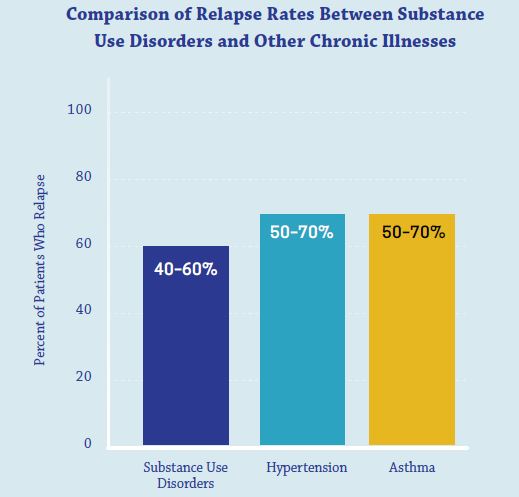
Rehab leads to sustained recovery supported by evidence
Could evidence based residential treatment help you or your loved one achieve sustained recovery from drug or alcohol addiction?
One of the most common questions people ask is: Does rehab work? The short answer is yes!
It can be a scary time when you or a loved one is lost in substance abuse and addiction. It is incredibly important that a person in this position gets help as soon as possible, before the addiction or alcoholism gets out of control and causes severe consequences.
Do you think you might be an addict or alcoholic? Click here to find out or click here to find out where you are in the stages of addiction.
Addiction rehab works according to the evidence:
This is the first post in our blog series 20 things you should know about rehabilitative treatment. This list was compiled by the European Association for the Treatment of Addiction, according to the latest evidence.

What is rehab?
Before we explain why rehab works, let’s define addiction treatment. According to the World Health Organisation, rehab is addiction treatment that helps people suffering from substance dependence using a variety of interventions to help them develop strategies to overcome their challenges and support them to live a productive life free from alcohol and drug use.
According to the WHO, rehabilitative treatment is a “comprehensive approach to identification, assistance, health care, and social integration with regard to persons presenting problems caused by the use of any psychoactive substance”. Importantly, the WHO points out that clients in treatment “are entitled to be treated with humanity and respect”.
Different treatment centres use different treatment strategies but the most successful facilities use evidence-based approaches such as these for treating addiction.
Rehab comes in a variety of forms including primary, secondary and tertiary residential programmes as well as outpatient programmes. Different kinds of therapy are delivered in these settings over varying lengths of time.
Rehab works as well as medical treatments for other chronic conditions, according to the evidence.
Rehab has been found to be as successful as medical treatments are for a range of chronic conditions, such as diabetes, asthma and high blood pressure. Many people may be shocked by this fact because, when it comes to addiction treatment, there is much talk about high relapse rates.

But relapse rates after rehab are similar to relapse rates for chronic diseases like diabetes and hypertension with an estimated 40 – 60% of individuals relapsing in recovery. Another misconception is that a relapse means treatment has failed. During treatment, an individual learns a lot about their disease which will benefit them when they decide to return to sobriety. A person who has relapsed needs to get help to return to recovery and potentially try a different rehab approach. Aftercare programmes reduce the rate of relapse.
Like diseases such as diabetes, addiction can not be cured, so it is important that people carry on ‘taking their medicine’ or, in this case, implementing what they learn in treatment to stay in recovery or remission.
Treatment success is also dependent on whether an individual completes the treatment programme but, unfortunately, an estimated 60% of individuals who enter treatment drop out – only four in 10 actually complete treatment programmes.
There is no doubt that attending rehab produces much better outcomes compared to no intervention at all. Research amongst prisoners in the United States has shown that drug use declines by an estimated 50 – 70% in those who received treatment upon their release from jail as compared to those who did not have access to rehab.
A lot of other factors can influence the likelihood that rehab will be successful including the type of drug used, the frequency of drug use and the duration of use as well as criminal behaviours, family environments, educational background, employment status and co-occurring health conditions.
How can rehab improve your life or the lives of your family?
There are many additional indicators of rehab success other than sobriety alone.
For example, going to rehab has been found to reduce criminality, reoffending and arrests in previous criminal offenders. Social skills are diminished in drug abusers and going to rehab has also been found to improve an individual’s general social and psychological functioning. Completing treatment for drug or alcohol addiction has been shown to improve an individual’s employability. Going to rehab is associated with an improvement in both the mental and physical health of individuals.
Addiction is often referred to as a ‘family disease’ because of the way it impacts those around the addict. Trust is often broken and relationships are neglected and suffer as a result. When an addict gets well, this improves the lives of their loved ones. Additionally, many rehabs offer counselling for families and loved ones as well as support groups. Involving families in the recovery process also greatly improves a client’s chances of long-term sobriety.
Is rehab worth the financial cost?
Beyond benefitting the actual person suffering from addiction and their families, accessing treatment has been found to benefit society at large.
Research has shown that the financial savings far outweigh the costs of treatment. Individuals and countries spend less on health care for those who participate in treatment as there is a reduction on the demands of health and social services.
Also, money is saved on a societal level because of the lower rates of criminal activity amongst those who complete treatment. Individuals experience financial savings by spending much less money on purchasing substances. There is another monetary benefit for society from improved employability and less absenteeism in those who complete addiction treatment compared to those who don’t access rehab.
Choosing the right rehab is vital.
Choosing the right rehab programme is incredibly important.
The type of programme needed depends on the severity of the addiction and on what type of treatment an individual has received before. Long term treatment is often needed for those with more severe substance use problems and for those who have relapsed after shorter treatment programmes in the past.
There is a huge variety of rehab programmes to choose from and making a choice can be overwhelming. It is best to look for facilities that use a variety of evidence-based treatment strategies.
NB: people referred to right type of treatment
Not all services are equally effective – many could be more effective and some may even make matters worse. Do you think you might need treatment for addiction? Find out if you are an addict or alcoholic and contact us today for an obligation-free assessment. There is always help and there is always hope and help available. Changes Rehab Johannesburg is here to guide and support you through each step.
Call 081-444-7000 or email [email protected] to get the help you need today.
Rehab evidence shows treatment delivers sustained recovery from drug and alcohol addiction and evidence based residential care can help you or a loved one. Changes team counsellors are here to help you.Rehab Works Evidence Proves Treatment Delivers Recovery








